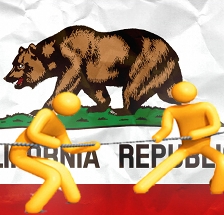Anti-PokerStars Tribal Collation Attack California Poker Bill

Last week, an anti-PokerStars tribal coalition headed by the Pechanga Band of Luiseño Indians attacked California Assemblyman Reggie Jones-Sawyer’s (D-Los Angeles) online poker bill, branding it as “fatally flawed”. The tribal collation subsequently sent a letter to the Assemblyman criticizing bill AB 167 for including the horse racing industry in any future regulated online poker landscape, as well omitting a “bad actor” clause which could potentially pave a way for the return of PokerStars to the US. As an excerpt from the letter explains:
“The citizens of California deserve protection from bad actors. The language proposed in AB 167 is not sufficient to protect the integrity of the California market.”
Letter Signed By Multiple Tribes
While the Golden State has plenty of interested parties willing to suport online poker legislation, getting them all to line up behind a single bill is proving to be a formidable challenge. Currently threatening to halt California’s drive towards regulated iPoker for another year is the Pechanga Band of Luiseno Indians, together with a number of other tribal interests, including the Agua Caliente Band of Cahuilla Indians, Barona Band of Mission Indians, Lytton Band of Pomo Indians, Viejas Band of Kumeyaay Indians, and the Yocha Dehe Wintun Nation.
Back in 2014, a coalition of 13 tribes sent a letter to Jones-Sawyers which eventually resulted in the Assemblyman having to shelve his bill towards the end of last year. Mirroring these actions, a 6 tribe coalition has now sent a similar letter to Jones-Sawyers, and while the number of tribes opposing bill AB 167 has now more than halved, these tribes’ opposition to PokerStars and the horse racing industry still gives the group plenty of influence in the statehouse. In addition, the Sycuan Band of the Kumeyaay Nation is also believed to have sent a similar letter to Reggie Jones-Sawyer.
No iPoker For Horse Racing Industry
In its letter, the 6 tribe coalition asserted their opposition to the horse racing industry‘s inclusion in any future Californian iPoker industry, and highlighted the fact that it was the Tribal Nations, and not the horse racing industry, which has a “demonstrated history of responsible gaming.” Furthermore, the coalition asserted that while Californian voters have generally been supportive of expanded Native American gaming, this has not generally been the case for expanded gambling at horse racing venues, and as an excerpt of their letter explains:
“It must be noted that the voters of California have voted on multiple occasions [1998, 2000, 2008] in support of tribal government gaming and have given overwhelming approval to a Constitutional Amendment granting Indian tribal governments exclusive authority over Las Vegas-style casino gaming. By comparison, the voters have rejected expanded gaming at horse racing facilities by an astounding 84 percent to 16 percent vote.”
Unscrupulous Brands Should Also Be Excluded
The letter further insists that a bad actor clause should be included in order to prevent “unscrupulous entities and brands” from entering a regulated Californian online poker, and in so doing potentially undermining public trust in any future internet poker system implemented by the state. To dispel any doubts as to whom the tribes were referring, the letter mentions Absolute Poker, Full Tilt Poker and PokerStars by name as operators which explicitly flaunted the Unlawful Internet Gambling Enforcement Act (UIGEA) by continuing to accept wagers from U.S. poker players post December 31st, 2006.
Furthermore, the tribal coalition also referred to the state of Nevada as having a bad actor clause in its internet poker regulations which includes “covered assets,” or those assets that may in some way be connected to bad actors. This point highlights the tribes’ opposition to Amaya Gaming launching its recently acquired PokerStars product in California, despite the fact PokerStars has since paid $731 million to the US Department of Justice by means of a settlement.
Divisions Remain
While various studies such as the one published by GamblingCompliance have suggested California was one of the US states most likely to introduce online poker in 2015, it is clear the issue remains a divisive one amongst the state’s disparate gaming interests. It is also clear California’s chances of introducing regulation in 2015 are beginning to appear as distant as ever, and as the 6 tribe coalition’s letter reads:
“Our Tribal Governments have invested many hundreds of millions of dollars in brick-and-mortar operations that create tens of thousands of jobs for Californians. We did so in reliance on the rights granted by the people of California and the compacts we have negotiated with the State in the exercise of those rights. Legislation like AB 167.. should not move forward solely for the sake of supporting a business model that might possibly benefit a few tribes in the short term.”










